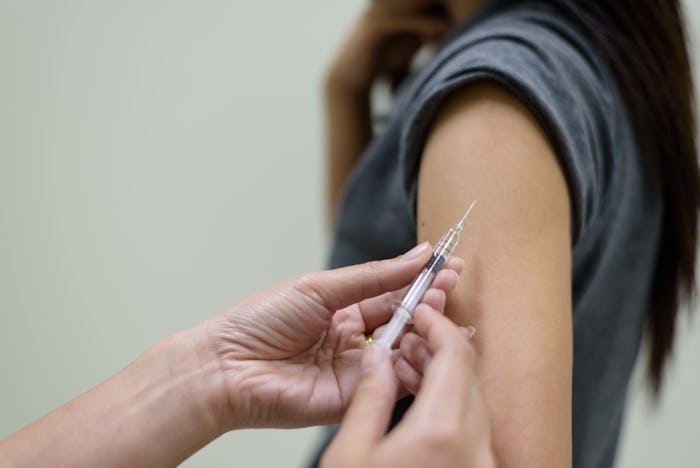Life
New Study Provides Further Evidence That The HPV Vaccine Is Necessary & Effective
During a time in which polarizing and incorrect information about the legitimacy and safety of vaccinations seems to be hitting a fever pitch (pun possibly intended) some may be wondering about the effectiveness of other vaccines, and their purported benefits. What about the HPV vaccine — can it prevent cervical cancer? A new study from the World Health Organization (WHO) evaluating data from around the world has some solid evidence to suggest that it does.
For the study, researchers from WHO analyzed data from 14 countries, accounting for more than 60 million people, as CNBC reported. They found that the two types of HPV that most often cause cervical cancers — anogenital warts and precancerous cervical lesions — have all declined since the introduction of the vaccine.
The study's findings were as follows: 5 to 8 years after vaccination, the types of HPV that cause 70 percent of cervical cancers dropped 83 percent amongst girls ages 13 to 19 and women ages 20 to 24, which is a really significant margin. The number of diagnoses of precancerous lesions decreased by 51 percent among girls aged 15 to 19 and women aged 20 to 24. Last, the number of cases of anogenital warts decreased by 67 percent among girls aged 15 to 19, and 31 percent among women between 25 and 29.
According to the U.S. Centers for Disease Control and Prevention (CDC), HPV, or Human papillomavirus, is the most common sexually transmitted infection in the world. Different from HIV and HSV (herpes), HPV can cause a variety of health issues, depending on the strain. Some will resolve on their own, others can cause genital warts, and certain cancers.
However, there are multiple FDA-approved vaccinations to prevent the infection; these are Gardasil, Gardasil 9, and Cervarix, according to The National Cancer Institute. These vaccines prevent infection of strains 16 and 18, which cause 70 percent of cervical cancers, as well as types 6 and 11, which cause 90 percent of genital warts. In addition, Gardasil 9 prevents five additional cancer-causing strains, which are 31, 33, 45, 52, and 58.
Given that these vaccinations are now available, WHO announced last year that they were making an effort to "eliminate" cervical cancer caused by HPV worldwide, and insofar as this new study is concerned, it appears that they are on their way to doing just that.
Back in April, the BBC reported that a team of academics from Strathclyde, Edinburgh, Aberdeen, and Glasgow Caledonian Universities in Scotland analyzed the health records of 140,000 women vaccinated, and found that it resulted in a "dramatic reduction of preinvasive cervical disease," which echoes the findings of the WHO's study as well.
Though women are primarily impacted by HPV, men can be carriers of the infection, according to NBC News. This is why some are advocating for the vaccination of both women and men. In fact, the WHO's most recent study showed a 48 percent decrease in HPV transmission from boys aged 15 to 19 and a 32 percent decrease in men aged 20 to 24.
“Because of our finding, we believe the WHO call for action to eliminate cervical cancer may be possible in many countries if sufficient vaccination coverage can be achieved,” Marc Brisson, a professor at Canada’s Laval University and one of the study’s authors, told CNBC of the findings.
HPV causing cervical cancer is a health crisis that can be prevented, but it's up to both men, women, and organizations such as WHO to ensure that every individual is educated, and has accessible resources to keep themselves, and their loved ones, safe and healthy.
